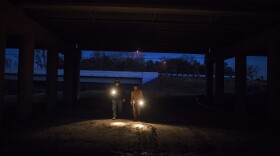Earlier this month, the U.S. Department of Justice said criminalizing people who are homeless for sleeping in public places is unconstitutional. However, Austin’s had a “no sit/no lie” ordinance since the early ‘90s that bans homeless people from lying down on city sidewalks and sleeping in public.
While sleeping on public benches is legal, in the past few years the city’s cut back on the number of benches.
Every day Jackson Long struggles to find some shade, a place that can shield him from Austin's sun. Often that's under trees near the UT campus.
"It's been kinda – you can hear it in my voice – I'm weary,” Long says. “I'm worn out.”
He’s sick too; he has a seizure disorder, he says.
The heat messes with his meds, Long says. He lies down on the ground, and that gets him in trouble with police. They ask him to leave. If he’s been sitting for more than 30 minutes, they ticket him too, because of Austin's no sit/no lie ordinance.
Due to his condition, he could argue the ticket in the Community Court downtown: If a person’s disability isn’t immediately observable to officers, the person can contest a ticket and get it dismissed.
Back in 1992 when the city passed no sit/no lie, the council wrote that people sleeping in areas of "high pedestrian traffic" can "contribute to a sense of fear, intimidation and disorder."
Ann Howard of the Ending Community Homelessness Coalition (ECHO) calls that "managing homelessness.”
“We need to not manage homelessness,” Howard says. "We need to end homelessness. And we end it with housing.”
Over the years Austin has revisited its no sit/no lie ordinance.
In 2010, the council agreed to put more benches downtown, so people like Long, who are homeless and have medical needs, could rest. But Howard says businesses complained because the benches became places for people to sleep.
A year later, the benches were removed.
This month’s brief from the Justice Department called for protections for homeless people in cities without sufficient shelter space.
"Sleeping is a life-sustaining activity,” reads the brief. “If a person literally has nowhere else to go, then enforcement of the ordinance against that person criminalizes her for being homeless."
In the case of Jackson Long, it happens all the time, but he’s not alone. There were 1,877 homeless people in Austin last year in ECHO’s 2015 homeless count, which represents a population decrease of about six percent over the last four years.
Despite the drop, Austin’s shelters are still frequently packed, leaving some, like Long, on the streets and at risk of being ticketed under the no sit/no lie ordinance. According to Austin Police, the Downtown Austin Community Court has seen 2,374 cases of no sit/no lie so far in 2015.







